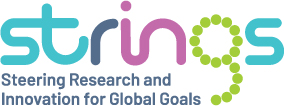On 4 September 2020 STRINGS held a lively and engaging workshop on mapping research related to the Sustainable Development Goals (SDGs), featuring 12 presentations from colleagues in academia, government and the private sector.
The workshop had two primary objectives:
- One transdisciplinary, to engage with different actors who are developing approaches and datasets and influencing decisions about research prioritisation in relation to the SDGs.
- One methodological, to discuss the significant technical challenges analysts face in the process of identifying research related to specific SDGs, and what agreements and disagreements there are in relation to the different approaches used.
Dr Tommaso Ciarli started the conversation by acknowledging the uneven distribution of scientific advances across societal problems, and how the STRINGS project is trying to contribute to this field by developing tools and findings to steer science, technology and innovation (STI) towards the SDGs.
In the first session of three presentations we discussed, among other things: (i) how machine learning approaches can enhance research strings based on keywords from SDG documents to flag scientific publications related to specific SDGs; (ii) the implications of having public tools to map and evaluate research related to SDGs across regions and organisations; (iii) what we can learn from research on the synergies between SDGs; and (iv) the potential for SDG related research to be associated with areas of economic research using Journal of Economic Literature codes.
The next session included three more, equally interesting, presentations. Two participants discussed possible ways to generate country profiles and analysis that help to understand how research priorities are aligned (or not) with SDG challenges across countries. Several results were also presented on the extent to which independent approaches/methods for mapping SDG research provide similar results. This discussion was a refrain throughout the rest of the workshop, with important implications for all SDG research mapping. Most participants acknowledged that different approaches to SDG research mapping seem to lead to substantially different results. This is something Dr Ismael Rafols has previously considered in his STRINGS blog, where he argued that different approaches will always depend on the particular interpretations the SDGs. As such, there should be a plurality of SDG mapping methodologies and not a single method to rule them all. Third, several difficulties in building reliable machine learning models to track SDG related content in any document were discussed, showing how these models can be improved by expert opinions on what documents may be related to any SDG.
The next three presentations included two discussions about a different approach to mapping SDG research that is based on clusters of publications that are connected by citation relations. The core idea that was proposed is to link groups of publications within the same research area to SDGs, instead of linking single publications to SDGs based on their abstracts. It was shown that this allows researchers to gauge the relevance of research that does not seem immediately related to the SDGs because it uses different terminology. In the same session, there was an interesting presentation that focused on how broad crowdsourcing approaches might help to identify whether a certain group of publications is associated with a certain SDG or not, and use this information to improve the methods discussed above.
Our last session was more policy oriented. Participants discussed different research funding initiatives and programmes related to the 2030 Agenda for Sustainable Development that are on the ground right now, and the role of national governments, regional organisations and multilateral agencies in pushing forward that agenda. The discussion centred on how funding agencies and international development agencies may benefit from a better understanding of how research is related to the SDGs, although with all caveats about accuracy discussed above.
To find out more please take a look at participants’ presentations, get in touch with us at strings@sussex.ac.uk or contact the presenters directly using the details available in the presentations and papers below.
To receive regular updates from STRINGS please sign up to our newsletter.
Presentations and papers
- Mapping scholarly publications related to the Sustainable Development Goals: Do independent bibliometric approaches get the same results? by Caroline S. Armitage, University of Bergen
- STeering Research and INnovationfor the Global goalS by Tommaso Ciarli, University of Sussex
- Mapping Research Systems in Relation to the Sustainable Development Goals by Hugo Confraria and Tommaso Ciarli, University of Sussex
- Classifying economics for the common good: Connecting sustainable development goals to JEL codes by Jussi Heikkilä, University of Jyväskylä
- Partnerships toward the goals: Crowd-sourcing a validation set to improve the delineation of research publications relevant to the UN SDGs by Bamini Jayabalasingham, Elsevier
- Mapping Research related to the SDGs by Francesco A. Massucci, SIRIS Academic
-
Linking Publications to SDGs: An Area Based Approach by Ed Noyons and Ismael Rafols, CWTS, Leiden University
-
Mapping and Mobilizing International Science and Technology for the SDGs by Katsia Paulavets, International Science Council
- Profiles of sustainable development research in Europe: A machine learning approach by George Richardson, Nesta
- Exploring the nature scientific research related to Sustainable Development Goals: The case of Colombia by Oscar Romero, Utrecht University
- SDGs and the role of national and regional science systems by Matthew L. Wallace, International Development Research Centre
- Discover and analyse research in context of the United Nations Sustainable Development Goals by Juergen Wastl, Digital Science

Leave A Comment